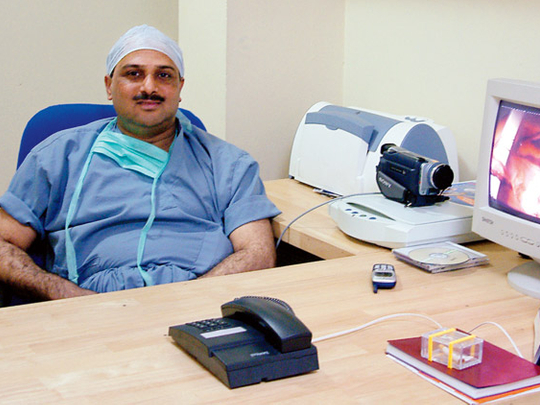
He has quite literally touched the hearts of more than 15,000 children.
Dr Mousa Kunhi, a renowned specialist in cardiology based in India, has conducted more than 15,000 heart-related surgeries on children, but two cases still remain on his mind - once when he operated upon a baby that weighed a mere 750g; and another time when he removed a tumour from a two-year-old girl. Incidentally, he also holds the record for operating upon the smallest infant in Asia.
Dr Kunhi, who has an ‘A grade' licence from the UAE Health Authority (wherein he can offer legal medical consultation across the country), was in Dubai recently on his way from Germany, where he conducted an artificial heart implant surgery.
A specialist in infant heart surgery, Dr Kunhi says, "It is a great responsibility and I am happy that these surgeries are successful." Talking about the highlights of his career, Dr Kunhi says, "I will never forget the time when I operated on an infant who weighed only 750g. I usually consult my teachers and fellow associates at different places to gauge the situation. However, that time, I had few people to discuss the case with. It was a great responsibility and I am happy that I triumphed in the surgery.
"Then there was also a case of a child who had developed a tumour on her kidney. The tumour weighed close to 4kg and had grown so large that it had begun to congest her heart. To do this surgery, I had to use deep hypothermic circulatory arrest. This is a state where the entire life process is stopped and the body is kept alive on machines.'' The surgery had to be completed in 40 minutes. "Having to remove a tumour in such a short span is extremely risky,'' he says. However, Dr Kunhi went ahead, "I was overwhelmed when I realised that I was successful.
"The girl is now studying in second grade and is absolutely healthy."
Dr Kunhi is keen to harness the powers of science to improve humanity. "We have to use our knowledge, experience and insights to help those in need. We have to constantly explore and resolve the issues of the hour. Also, we have to research to produce and provide low-cost efficient medical infrastructure. It is only then that the common man will benefit from technology," says the doctor.
To this end, he has set up a research foundation in Kerala, India, equipped with modern facilities. He hopes to bring together specialised people from various branches of science to enhance research in medicine, particularly, that of heart transplant.
"There are around 4,000 people across the globe living a normal life with artificial hearts,'' he says. "Connected to rechargeable batteries, the revolutionary artificial heart is a 8-10cm long tube with 4mm diameter of which one side is connected to the heart and the other to the aorta - the largest blood vessel in the body. Made up of titanium, it weighs around 300g and is based on the principle of axial flow. The few things to remember are: taking medication and changing the batteries every 15 hours. The whole apparatus weighs 1.5kg and has six batteries in it of which only one is used. The artificial heart is a solution to those patients who really have no other alternative," he says.











